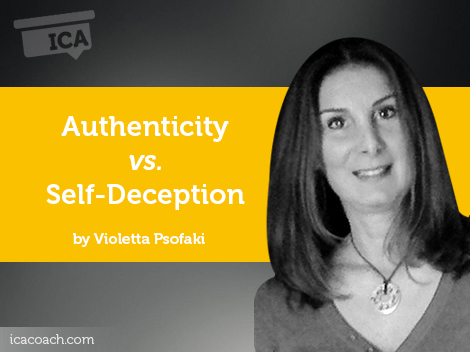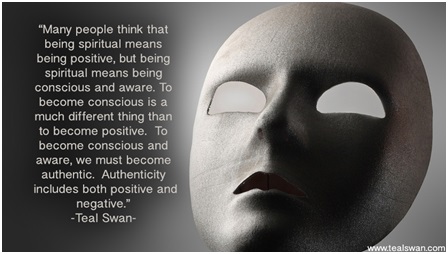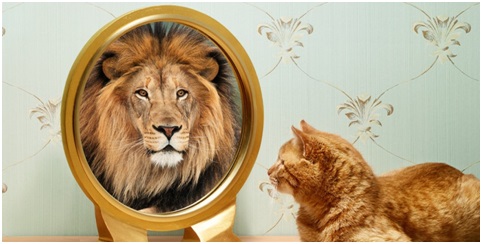
A Coaching Power Tool Created by Violetta Psofaki
(Transformational Coach, GREECE)
Authenticity is the daily practice of letting go of who we think we‘re supposed to be and embracing who we really are. Brené Brown
According Wikipedia, authenticity is the degree to which one is true to one’s own personality, spirit, or character, despite external pressures. Many notions of authenticity have coexisted for centuries under different guises. The most popular amongst scholars is Socrates’ admonition that
the unexamined life is not worth living.
Authenticity is not a role we play or a mask we wear, it is the genuine expression of who we are in a specific period of our life, because we are changing throughout our lives. It is the attempt to live our life according to the needs of our inner being, rather than the demands of society. Individuals concerned with living authentically have often led unusual lives that opposed cultural norms. According to Sartre, in human beings, existence precedes essence, which means that humans are not predefined beings but they create themselves through their choices and decisions and they have the freedom not only to compose themselves but to reform and change them as well.
Being authentic requires a lot of courage and bravery and unfortunately human behavior is mostly dictated by fear. Life for many people is a difficult balancing act because they believe in a way of living and they live in a totally different way. Authenticity means that we have a deep sense of what is important to us and we align our life to it using our strength in order to induce the necessary changes. To be authentic doesn’t mean to be perfect and saint, it means to be just ourself, our unique self. Exactly as love, compassion, truth, empathy are elements of human existence the same goes for fear, anger, shame. They all have their place in the palette of human emotions. We just need to recognize, to embrace and accept them. We should not be afraid of them, they are our teachers, they show us the path of self-redemption.
We should feel strong and safe within our own existence but at the same time we should be vulnerable and open. This is balance and with integrity, mindfulness, awareness and a sense of belonging are facets of authenticity.
Knowing your own darkness is the best method for dealing with the darkness of other people. Carl Jung
We don’t recognize that our story is just that, a story. We are full of fear, we justify, we find excuses, we dread that someone will see who we really are. And so, we tell lies to ourself and others and a time comes when we believe those lies and become prisoners to them. Henrik Ibsen, the Norwegian theatre director, coined the term “vital lies” for the fictions that families create to conceal more distributing truths that are too threatening, dangerous, or painful to be acknowledged. The lie is vital because it maintains a superficial harmony, although at great cost.
Self-deception is a mechanism of self-defense, of temporary self-relief, which distorts our perception of reality. We rap ourself in a new acceptable package and we create “personas” in order to belong. Our mask takes many forms and eventually becomes our prison. We long for getting out, being accepted and loved but what we reject we have to bury it, to keep it in the unconscious, to hide it from everybody. We don’t realize that what we cannot be with, won’t let us be. We don’t realize that if there was no dark we wouldn’t be able to know the light.
We take refuge in self-deception because shame can devastate our sense of self. We don’t trust or value ourself and we choose to believe in illusions. Dysfunctional excessive thinking is the reason why we are not willing to open up to others and to the world. The greater punishment is self-inflicted as we deprive ourself of the energy of the source and keeping us hostage to the past.
Self Application
Authenticity is the state where we don’t need to protect and defend our identity, we just need to direct our attention into our sensations. Being authentic means that we possess the capacity to be resourceful and creative, to make choices that reinforce our values and to take effective action no matter what is going on around us. It is a self-generated inner state and we can cultivate it.
The flow of new awareness is experienced when our mind and emotions are brought into alignment with our heart. The heart radiates an electromagnetic field that energetically affects those in our environment who can sense our feelings. So there is no point in pretending we are authentic, we don’t fool anyone. Authenticity goes hand by hand with trust, calmness and acceptance. It is the freedom from self-doubt and negativity which leads to flowing in the present moment, to intuition and profound realizations. Being in the authentic state is encouraging a shift in perspective, a shift from doing and having to being, a shift from autopilot to awareness.
Being authentic means that we are open to experience, we are listening in order to connect, we trust ourself and we filter everything through those filters. In order to be authentic we must know the truth about ourselves, we must be self-aware of what is happening within us, we must be in touch with our subconscious mind. To be successful in all the above we should build supportive structures such as the four agreements of Don Miguel Ruiz- be impeccable with your word, don’t take anything personal, don’t make assumptions, always do your best. Sophocles, the ancient Greek tragedian has said:
Lie never lives long to grow old.
Coaching Application
We, as coaches, must be mindful, must be present in the moment, trusting ourself, the client and the procedure, always remember that the client is the expert, be non-judgmental, challenge the client and walk the talk. We are, as coaches, afraid just as anybody else and we should be the first to know about it and own it. We have fears of how we show up, of saying the wrong thing, of losing the clients, of asking the right questions and we should be honest with ourself about all those fears. Sometimes we are so concerned wondering if we are doing it right and we become so self-preoccupied that we don’t pay the due attention in our clients. Fear of being embarrassed keeps us from being authentic (there is always this little voice inside our head saying that we are not good enough).
It is not our job to redesign or reshape people into something that is better. We must be attentive and caring about our clients, to get to know who they are and what their true needs are, because the needs are different for every person. The best we can offer to our clients is our authentic self. Being ourself, being fully present, adds value. Being with a client in a non-judgmental, listening place creates ideas that generate momentum for the client to build bridges from the ideas to actions. This is a flowing state where we follow the client.
We can recognize self-deception, if we are listening attentively, in a client when they are defensive, inconsistent and make excuses. Listening will help us to identify the moments when integrity slips and there is avoidance of the truth. In cases where self-justification is blocking our client’s vision of the truth, as coaches, we should have the client check their beliefs and perspectives in order to find their truth and shift their reality. We can help them become aware of their behavior just by being the person they will talk to out loud. Powerful questions make the client stop for a while and think, which creates a helpful distance from the situation. To be connected with our intuition is powerful and will help us in discerning the subtle contradictions in our client’s values and behaviors. We can also support them by giving them feedback that will create more self-awareness for them. From the created safe space the coach is listening for the client’s willingness to explore and experience their higher self. We should always move into the coaching relationships following our guiding principles of our life. It is very difficult indeed to get caught up in the mundane everyday world and not to lose connection with our truth and our authentic self. It is a great gift for us, as coaches, to know at any time who we are and what we represent because this is the source of our personal power, an anchor, the treasure and alchemist within us that will support our clients to their journey. After all, the inner purpose is the same of all human beings, to awake to themselves and to the world.
Reflection
- Who is your life asking you to be?
- How do you view your world? How does this impact you?
- What exactly do you know about your authentic self?
- What is there in your head when you are not present in the moment?
- Are you aligned with and living according your authentic inner self?
- What are your guiding principles in life?
- What are the behaviors you see in people who live in self-deception?
- How can your coach support you in leading an authentic life?
- Who you choose to be?
- How acting like someone you are not has served you so far?
- What do you feel to be true?
- What is trying to emerge from this situation?

